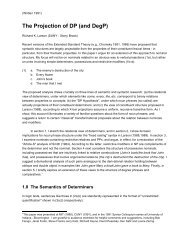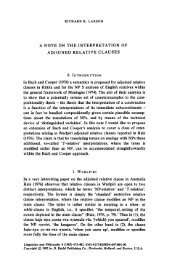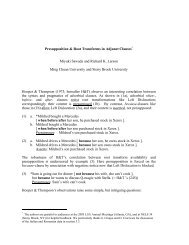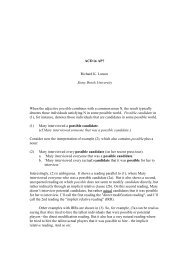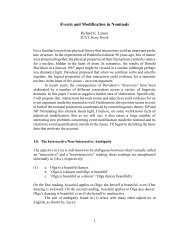Intensional Transitive Verbs and Abstract Clausal Complementation
Intensional Transitive Verbs and Abstract Clausal Complementation
Intensional Transitive Verbs and Abstract Clausal Complementation
Create successful ePaper yourself
Turn your PDF publications into a flip-book with our unique Google optimized e-Paper software.
<strong>Intensional</strong> <strong>Transitive</strong> <strong>Verbs</strong> <strong>and</strong> <strong>Abstract</strong> <strong>Clausal</strong> <strong>Complementation</strong><br />
comment on examples like (25a), where the infinitival to bearing Null Case co-occurs with a for bearing<br />
ACC:<br />
(25a) Max [ VP prefers [ CP for [ AgrsP him to be patient]]]<br />
Logically, it seems that both Case features must be checked by the subject him occurring in the lower<br />
clause. But how exactly should this go?<br />
Following Chomsky <strong>and</strong> Lasnik’s lead, let us assume that Null Case is in fact a form of Nominative<br />
Case, which is "light" in the following sense:<br />
• Chains headed by the phonologically empty element PRO can be made visible by light NOM<br />
Case, 21<br />
• Chains headed by any phonologically contentful element can bear light NOM Case, but cannot<br />
be made visible by it.<br />
These proposals entail that a phonologically contentful argument may bear light NOM Case, but that it<br />
must also bear another Case feature for convergence. Thus, assume that the embedded subject (him) in<br />
a for-to infinitive like (25a) enters the numeration bearing two formal Case features: light Nominative <strong>and</strong><br />
Accusative. The former is checked by to in the embedded clause; the latter is checked by for in Agr o Spec<br />
after incorporation of C to V <strong>and</strong> raising of V-C:<br />
(34) Max [ Agro P him prefers-for [ VP t [ CP t [ Agr s P<br />
\_ ACC√ _/ LIGHT \ NOM / √<br />
t to be patient]]]]<br />
This situation contrasts with that in a st<strong>and</strong>ard ECM construction like (35), where the embedded subject<br />
(him) can be assumed to enter the enumeration bearing only an Accusative Case feature. This single<br />
feature is checked in Agr o Spec.<br />
(35) Max [ AgroP him believes [ VP t [ AgrsP t to be patient]]]<br />
\_ ACC√ _/<br />
2.3.2 Blocking Passive in For-to Infinitives<br />
The double Case-checking apparently required with for-to examples like Max prefers for him to be patient<br />
is odd from a general conceptual point of view. Chains are st<strong>and</strong>ardly assumed to enter into biunique<br />
relations with formal contents like Φ-features, Θ-role, <strong>and</strong> Case, so that each chain receives exactly one<br />
The view that control PRO is fundamentally Nominative is further supported by Terzi’s (1992) analysis of subjunctive<br />
clauses in the Balkan languages, <strong>and</strong> by Iatridou’s (1993) discussion of similar facts in Greek. See also Watanabe<br />
(1993) for related discussion.<br />
21 We assume that the abstract WH operator of infinitival subject relatives can likewise be made visible by light<br />
Nominative Case.<br />
13



